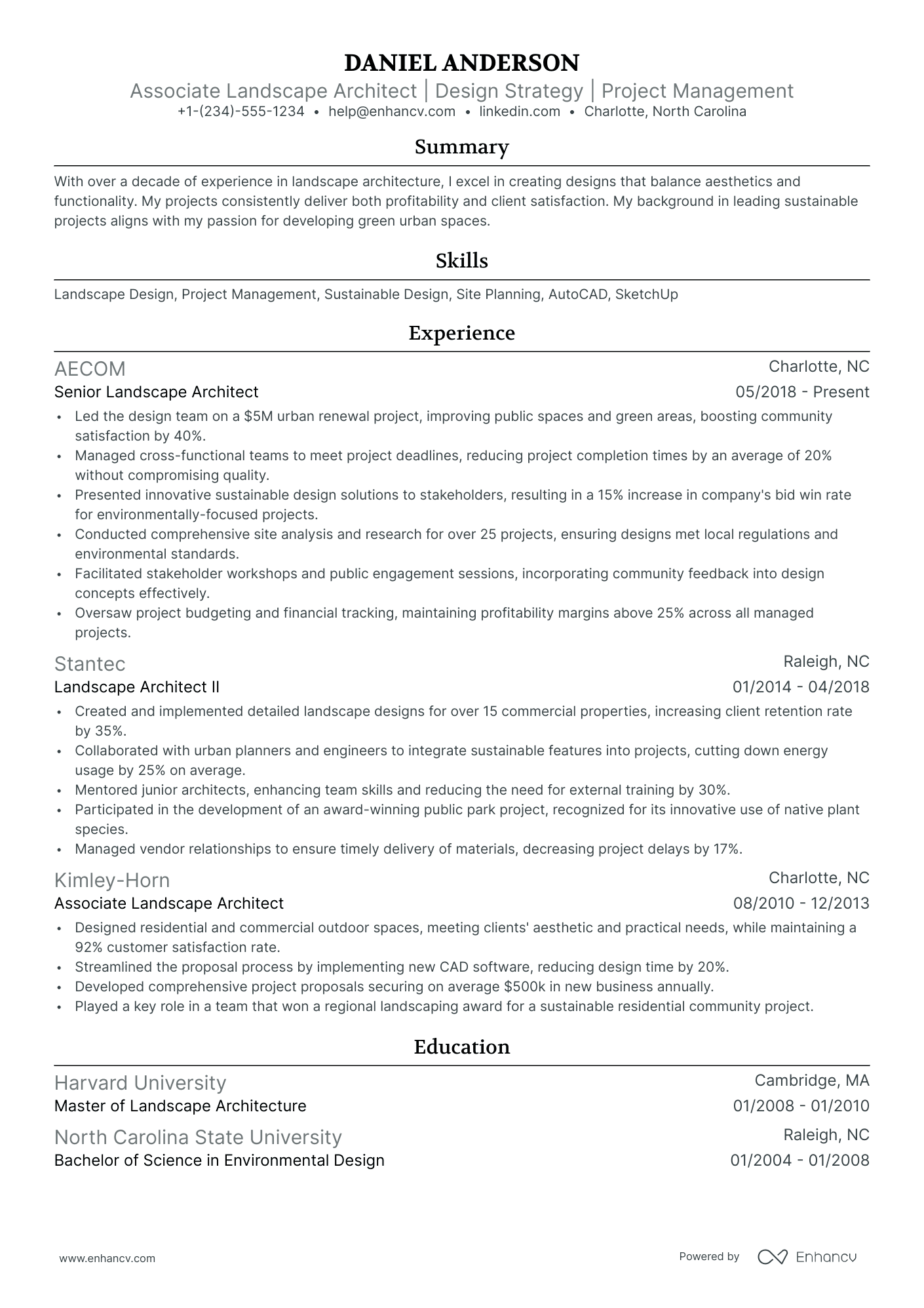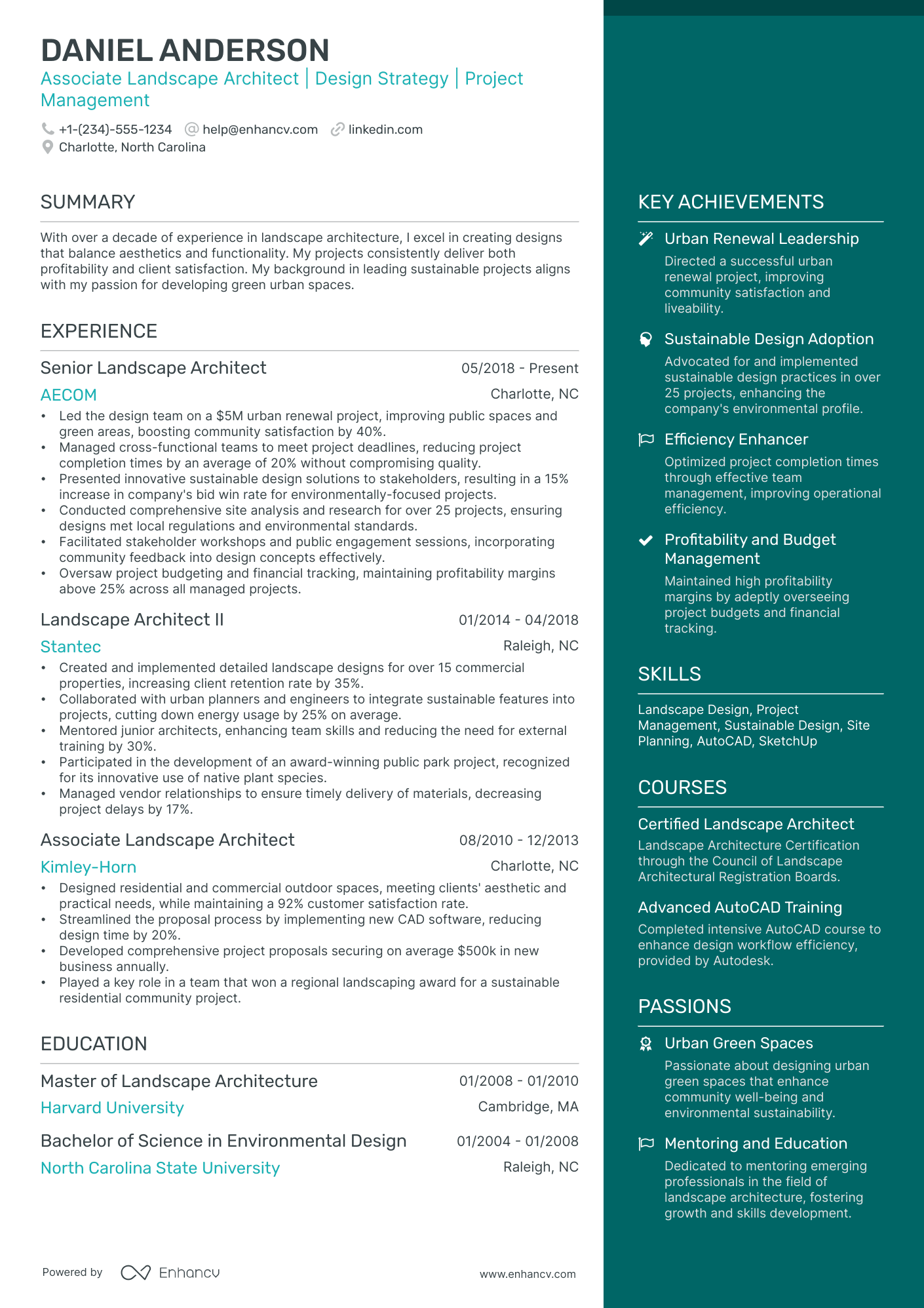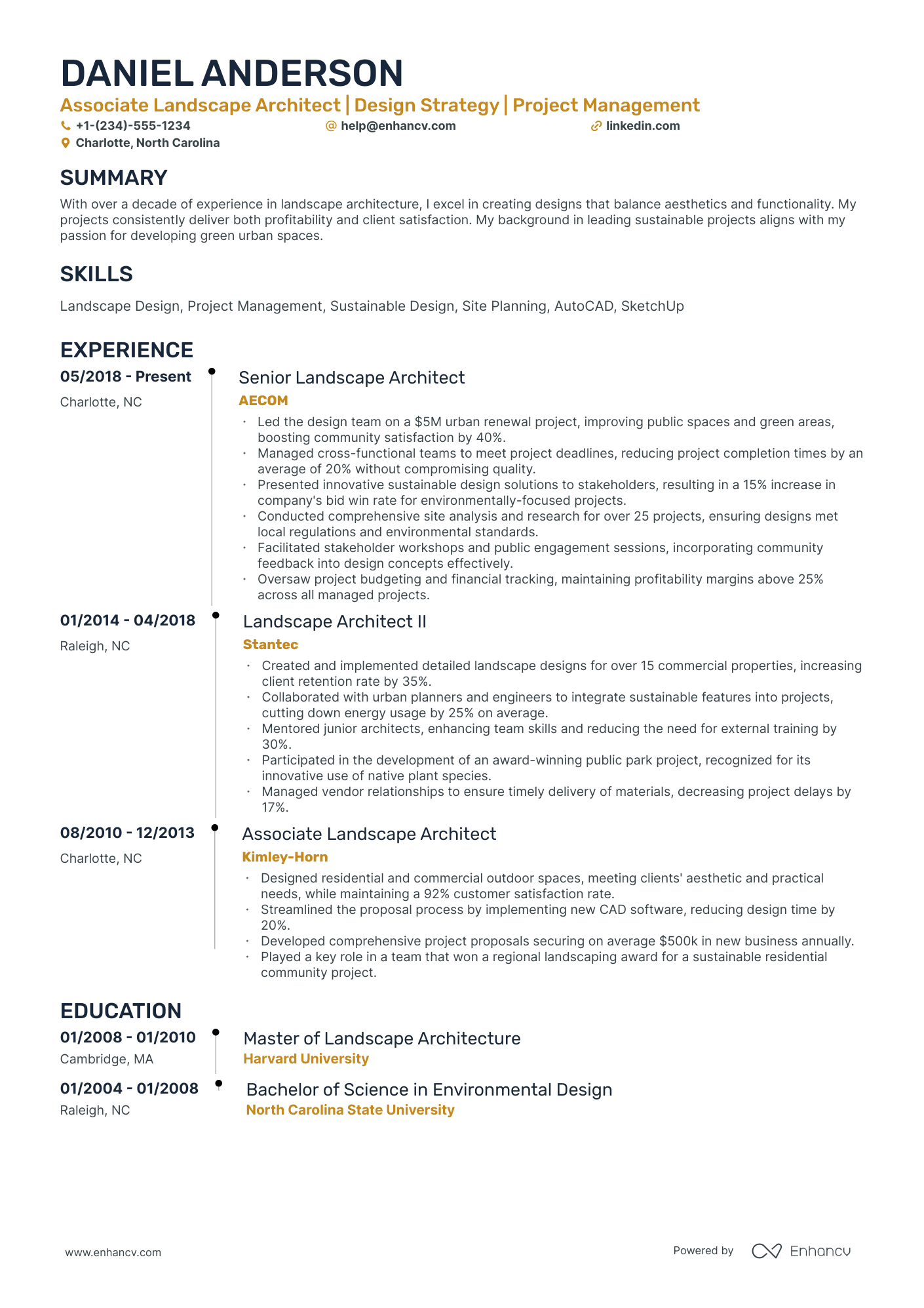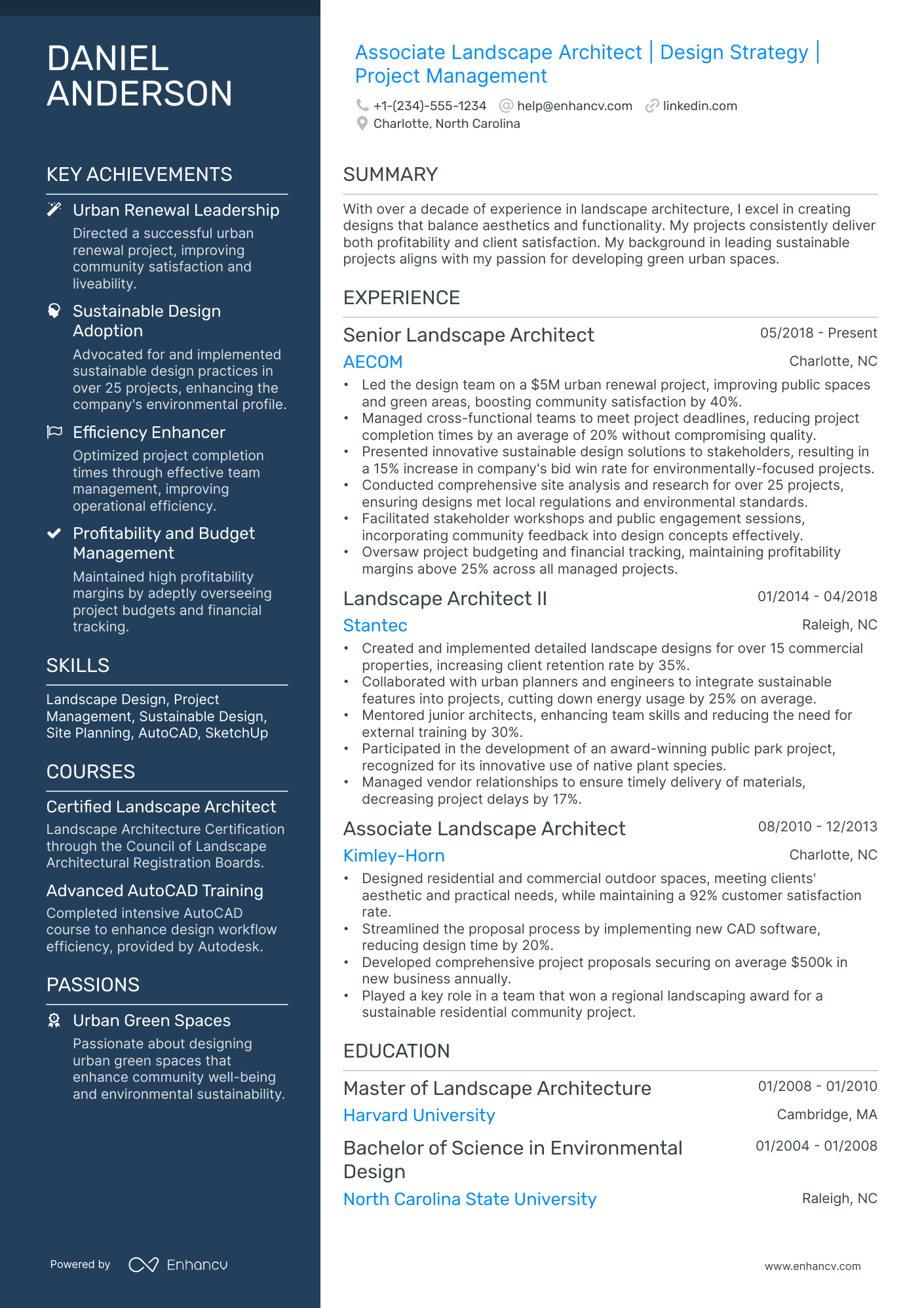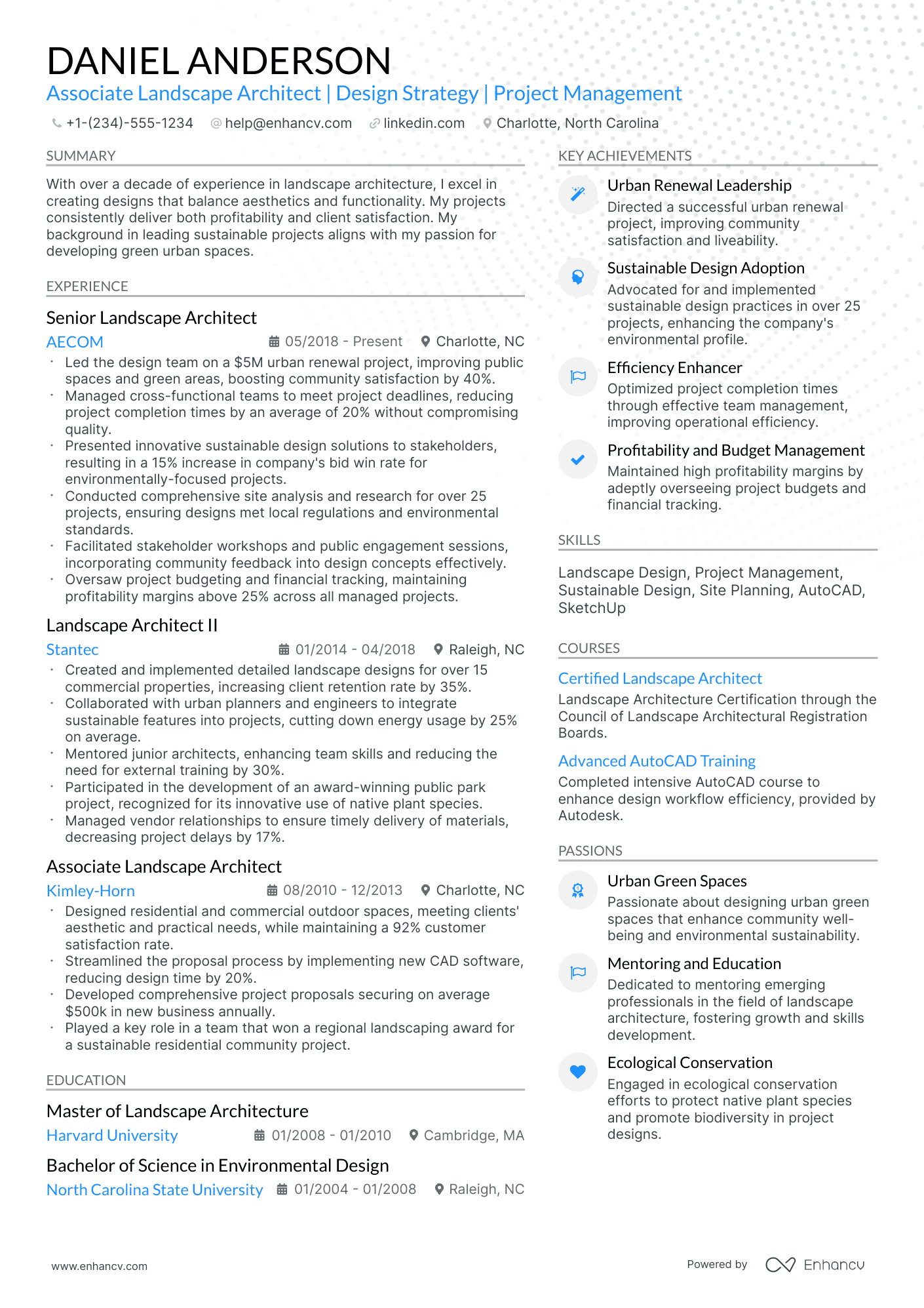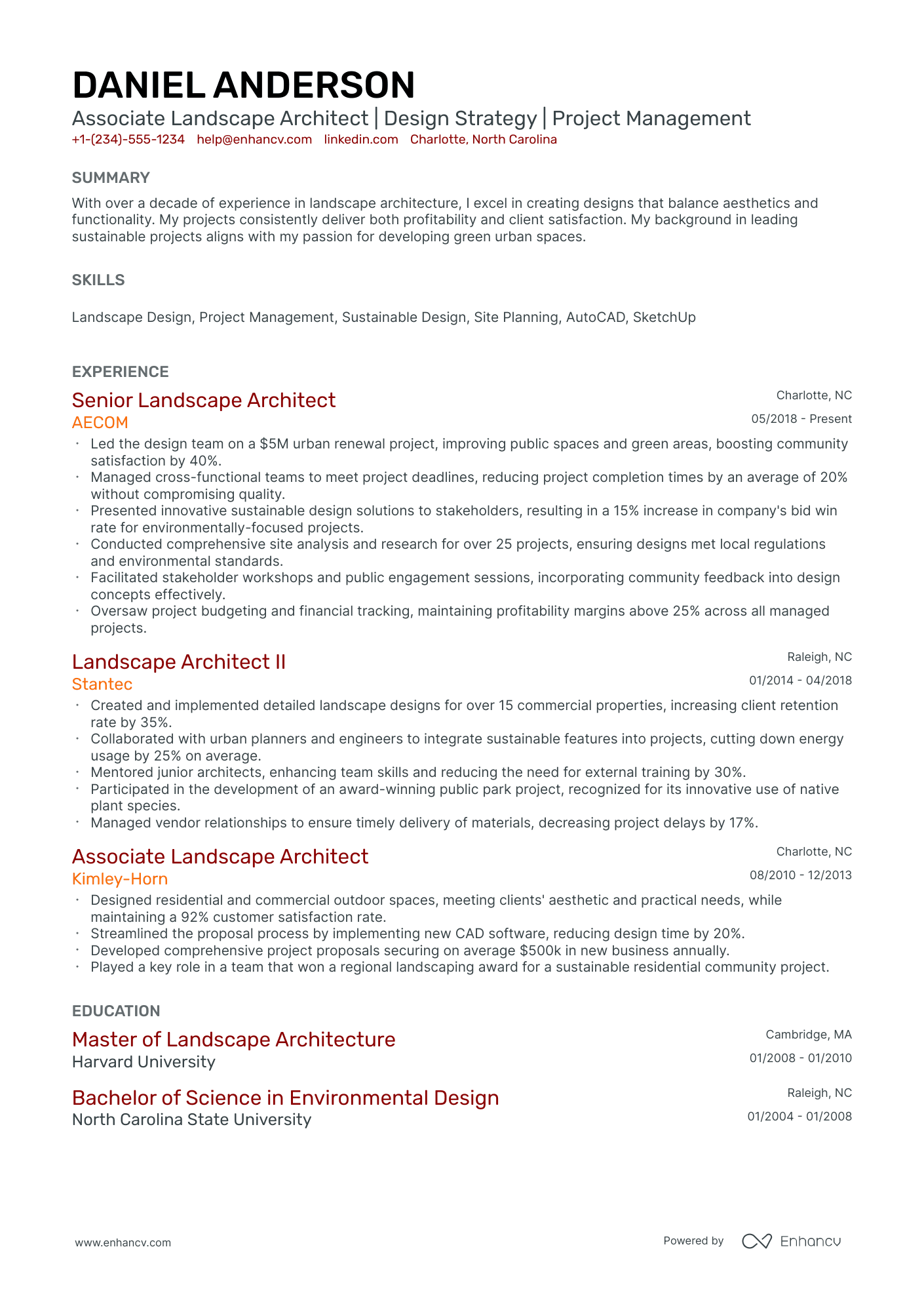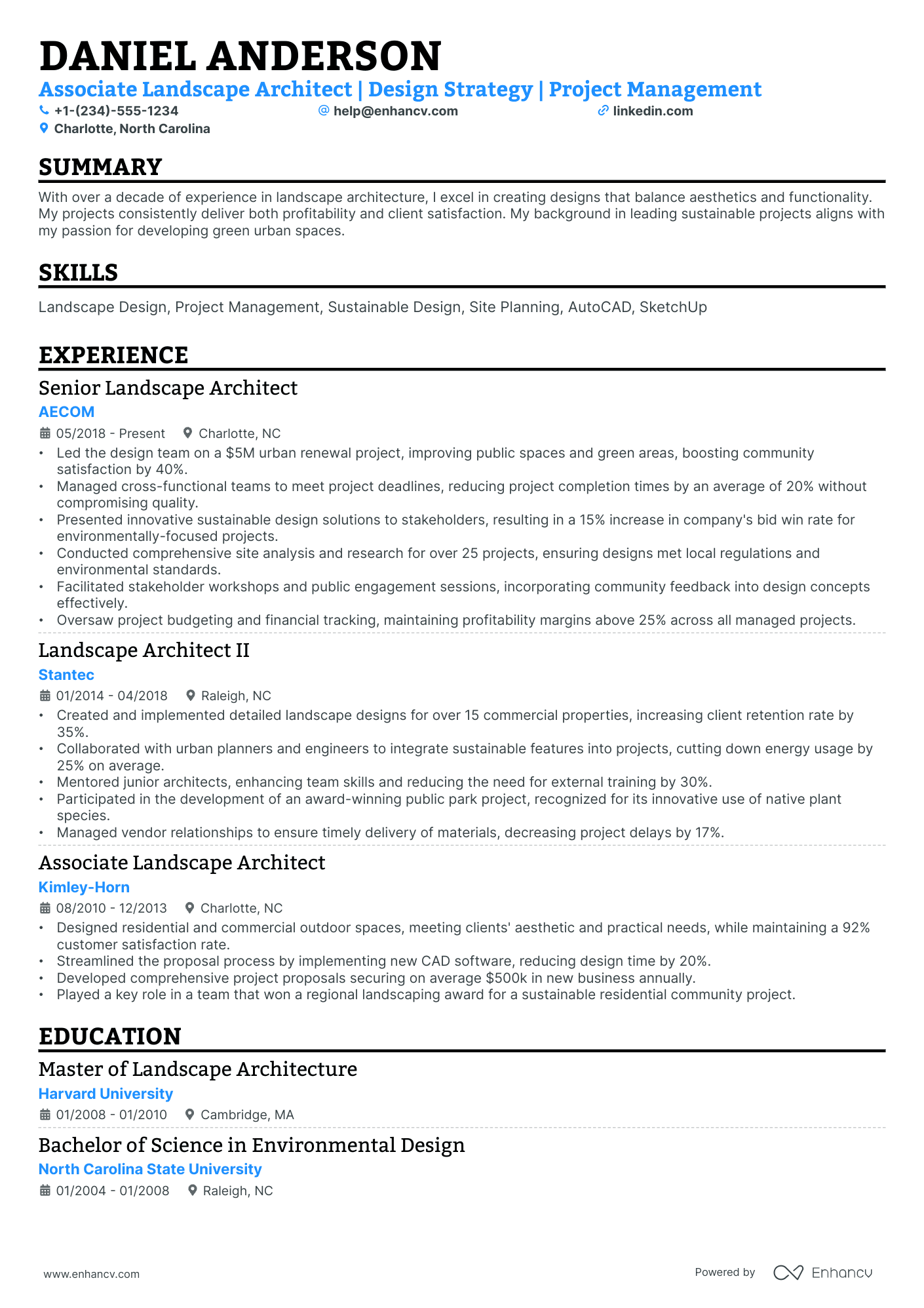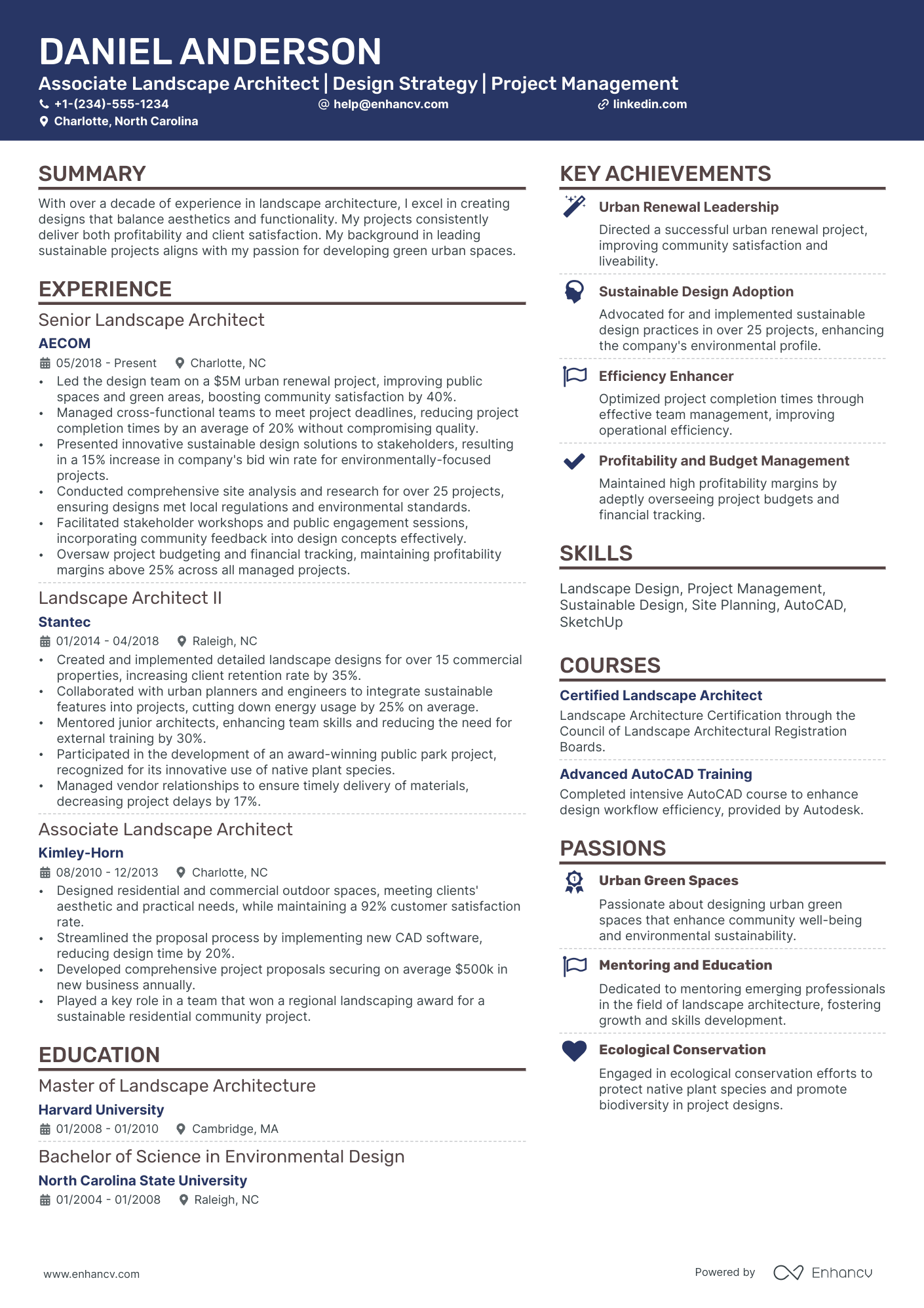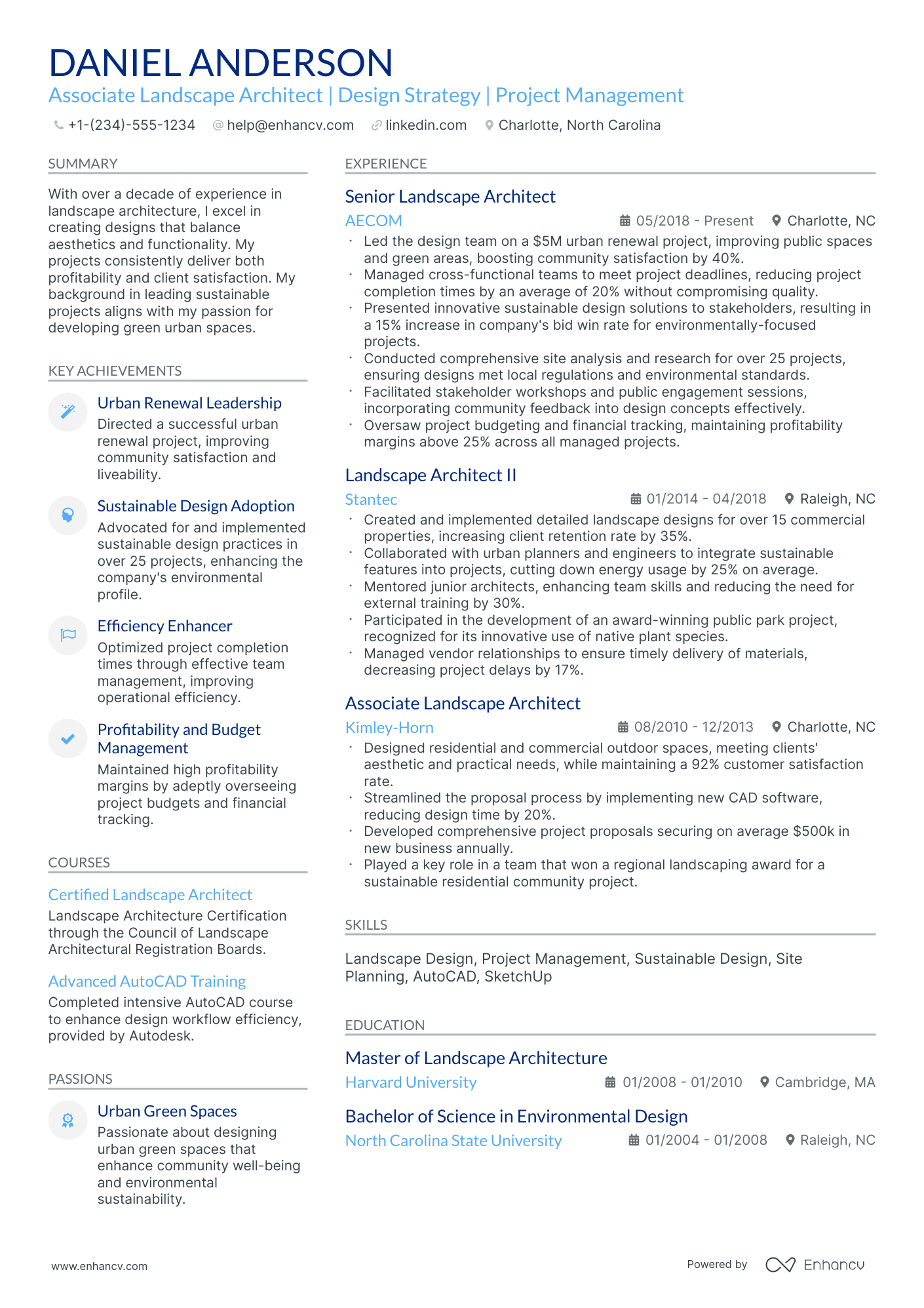As a landscape architect, effectively showcasing your projects and design skills while adapting to different job applications can be a significant resume challenge. Our guide provides tailored strategies to help you articulate your creative process and professional experiences, ensuring your resume resonates with potential employers.
- Landscape architect resumes that are tailored to the role are more likely to catch recruiters' attention.
- Most sought-out landscape architect skills that should make your resume.
- Styling the layout of your professional resume: take a page from landscape architect resume examples.
How to write about your landscape architect achievements in various resume sections (e.g. summary, experience, and education).
- Architectural Project Manager Resume Example
- Electrical Manager Resume Example
- Director of Engineering Resume Example
- Construction Worker Resume Example
- Automotive Engineering Resume Example
- Geotechnical Engineering Resume Example
- Aerospace Engineering Resume Example
- Construction Superintendent Resume Example
- Construction Manager Resume Example
- Electrical Project Manager Resume Example
Creating the best landscape architect resume format: four simple steps
The most appropriate landscape architect resume format is defined by precision and a systematic approach. What is more, it should reflect upon how your application will be assessed by recruiters. That is why we've gathered four of the most vital elements to keep in mind when designing your resume:
- It's all about presenting how your experience or skills align with the job. Use the reverse-chronological resume format , if your expertise is relevant to the landscape architect role. Otherwise, select the functional skill-based resume format or the hybrid resume format to shift the focus to your skill set.
- Resume header - make sure you've filled out all relevant (and correct) information, like your contact details and link to your portfolio.
- Resume length - unless you've over a decade of applicable expertise in the field, stick with a one-page resume format. If you'd like to present more of your professional experience, go up to two pages.
- Resume file - submit your landscape architect resume in a PDF format to ensure all information stays in the same place.
Upload & Check Your Resume
Drop your resume here or choose a file. PDF & DOCX only. Max 2MB file size.
PRO TIP
If you failed to obtain one of the certificates, as listed in the requirements, but decide to include it on your resume, make sure to include a note somewhere that you have the "relevant training, but are planning to re-take the exams". Support this statement with the actual date you're planning to be re-examined. Always be honest on your resume.
The key to your landscape architect job-winning resume - present your expertise with these sections:
- A header to make your resume more scannable
- Snapshot of who you are as a professional with your resume soft skills, achievements, and summary or objective
- Job advert keywords in the skills section of your resume
- Resume experience quantifying your past job successes with metrics
- A relevant education, certification, and technical sills section to provide background to your technological/software capabilities
What recruiters want to see on your resume:
- Design and planning skills demonstrated through a portfolio of successful landscape architecture projects
- Proficiency with landscape design software such as AutoCAD, Adobe Creative Suite, SketchUp, and Rhino
- Knowledge of native plants, ecology, and sustainable landscaping practices
- Experience with site analysis, including topography, soil, climate, and drainage
- Strong communication skills for client interactions, presentations, and collaboration with multidisciplinary teams
Writing your landscape architect resume experience
Within the body of your landscape architect resume is perhaps one of the most important sections - the resume experience one. Here are five quick tips on how to curate your landscape architect professional experience:
- Include your expertise that aligns to the job requirements;
- Always ensure that you qualify your achievements by including a skill, what you did, and the results your responsibility led to;
- When writing each experience bullet, ensure you're using active language;
- If you can include a personal skill you've grown, thanks to your experience, this would help you stand out;
- Be specific about your professional experience - it's not enough that you can "communicate", but rather what's your communication track record?
Wondering how other professionals in the industry are presenting their job-winning landscape architect resumes? Check out how these landscape architect professionals put some of our best practices into action:
- Led the design and implementation of a sustainable urban park in a major metropolitan area, increasing community greenspace by 35%.
- Successfully coordinated with civil engineers and biologists to integrate a habitat restoration project into a commercial development, boosting local biodiversity.
- Implemented innovative stormwater management techniques in a residential landscape design, reducing runoff by 25% and setting a new standard for future projects.
- Oversaw a team of junior landscape architects on large-scale projects, ensuring project deliverables were met on time and within budget.
- Developed comprehensive site analysis and master planning for a 50-acre botanical garden renovation that attracted 20% more visitors annually.
- Spearheaded the adoption of 3D landscaping design software, enhancing design visualization and client approval rates by 30%.
- Collaborated with cross-disciplinary teams to develop eco-friendly landscape solutions for urban infrastructure projects that saved the municipalities 15% in maintenance costs.
- Managed the landscape design for a new residential subdivision, which included native plant selection to minimize water usage and maintain local ecological balance.
- Authored several successful grant proposals for public garden projects, securing over $500,000 in funding for community-based greening initiatives.
- Designed custom residential gardens, resulting in a 40% increase in client referrals due to high satisfaction with personalized, functional outdoor spaces.
- Provided landscape rehabilitation planning for areas affected by natural disasters, contributing to quicker community recovery and resilience.
- Led workshops for professional development in sustainable landscaping practices, increasing department expertise and service offerings.
- Prepared detailed horticultural plans for commercial clients that reduced their landscape maintenance costs by 20% through the selection of low-care plant species.
- Contributed to the landscape design of a high-profile municipal park, which won the ‘Urban Green Space Award’ in 2010.
- Utilized GIS tools to analyze topography and optimize the use of space in land development projects, enhancing functionality and aesthetic appeal.
- Master planned and executed the landscape design for a 200-unit eco-friendly housing development, prioritizing walkability and communal recreational areas.
- Directed the restoration of historical public gardens, which preserved cultural heritage and increased tourism by 10% within the first year.
- Collaborated with environmental scientists to incorporate xeriscaping in arid regions, decreasing water usage for landscaping needs by 50%.
- Facilitated community engagement sessions to gather input for a new urban plaza, resulting in a highly utilized public space that catered to diverse groups.
- Implemented advanced soil analysis for major gardening projects, improving plant health and longevity while reducing replacement costs by 18%.
- Enhanced the firm’s landscape design portfolio by incorporating contemporary elements into traditional settings, maintaining compatibility with historical architecture.
- Guided the digital transformation of landscape design processes by integrating BIM technology, yielding a 20% increase in productivity.
- Created a rooftop garden design for an urban corporate headquarters that included a rainwater harvesting system, mitigating stormwater discharge by 30%.
- Developed and facilitated intern training programs, fostering the next generation of landscape architects and establishing a robust talent pipeline for the firm.
- Integrated sustainable practices into all project phases, significantly cutting materials cost by 25% while adhering to environmental regulations and standards.
- Managed the successful redesign of a historic downtown alley into a vibrant pedestrian walkway, which enhanced local business revenue by 15%.
- Initiated a remote sensing program to evaluate the health of urban tree canopies, aiding in the strategic planning for planting and conservation efforts.
- Conducted landscape visual impact assessments for large-scale wind farm projects, facilitating approval from local planning authorities.
- Championed the development of an interactive community garden, fostering social cohesion and providing educational opportunities for sustainable living practices.
- Implemented cutting-edge photovoltaic integrated shading structures in commercial landscapes, promoting energy efficiency and innovation.
The following content includes information from "O*NET OnLine" by the U.S. Department of Labor, Employment and Training Administration (USDOL/ETA). Used under the CC BY 4.0 license. The data represents the top responsibilities present on the task lists for landscape architect professionals.
Top Responsibilities for Landscape Architect:
- Prepare graphic representations or drawings of proposed plans or designs.
- Confer with clients, engineering personnel, or architects on landscape projects.
- Integrate existing land features or landscaping into designs.
- Inspect landscape work to ensure compliance with specifications, evaluate quality of materials or work, or advise clients or construction personnel.
- Analyze data on conditions such as site location, drainage, or structure location for environmental reports or landscaping plans.
- Develop marketing materials, proposals, or presentations to generate new work opportunities.
- Manage the work of subcontractors to ensure quality control.
- Present project plans or designs to public stakeholders, such as government agencies or community groups.
- Prepare site plans, specifications, or cost estimates for land development.
- Create landscapes that minimize water consumption such as by incorporating drought-resistant grasses or indigenous plants.
Quantifying impact on your resume
- Include the total area of landscape projects designed, as this demonstrates the scale of your work experience.
- List the percentage of projects completed on time and within budget to show project management skills and efficiency.
- Quantify the number of projects that have achieved LEED certification or other environmental standards to exhibit a commitment to sustainability.
- Specify the amount of water or energy saved through your sustainable designs to highlight your contribution to resource conservation.
- Detail the budget size you have managed for projects, which shows financial acumen and ability to handle large-scale financial resources.
- Present the number of awards or recognitions received, which underlines the quality and innovation of your work.
- Indicate the number of professional presentations or publications, showcasing industry thought leadership and expertise.
- Mention the count of client consultations or community engagements conducted to demonstrate communication skills and stakeholder management.
Action verbs for your landscape architect resume
What if you don't have any experience?
There are two very common scenarios about candidates with less experience. They are either:
- Fresh out of college in search of a landscape architect role
- Transferring over from a completely different field
Both of these types of candidates still have a shot at landing their first job in the industry.
All they need to do about the experience section of their landscape architect resume is:
- Consider their strengths - would the outcomes of their previous roles or niche skill sets impress recruiters? Feature those towards the top of your resume
- Exclude any and all irrelevant experience items - remember that at the end of the day, you're telling a story that aims to align with the ideal candidate for the landscape architect job
- Win recruiters over with personality - perhaps your ambition, dreams, and diligence would make you the perfect fit for the landscape architect role. Dedicate resume space to detail your personality traits by showcasing how they've helped you succeed in past roles
- Tailor your experience to specific job requirements - ensure your landscape architect resume answers the advert in the best way possible.
Recommended reads:
PRO TIP
If you happen to have some basic certificates, don't invest too much of your landscape architect resume real estate in them. Instead, list them within the skills section or as part of your relevant experience. This way you'd ensure you meet all job requirements while dedicating your certificates to only the most in-demand certification across the industry.
The heart and soul of your landscape architect resume: hard skills and soft skills
If you read between the lines of the landscape architect role you're applying for, you'll discover that all requirements are linked with candidates' hard skills and soft skills.
What do those skills have to do with your application?
Hard or technical skills are the ones that hint at your aptitude with particular technologies. They are easy to quantify via your professional experience or various certifications.
Meanwhile, your soft skills are more difficult to assess as they are personality traits, you've gained thanks to working in different environments/teams/organizations.
Your landscape architect resume skills section is the perfect opportunity to shine a light on both types of skills by:
- Dedicating a technical skills section to list up to six technologies you're apt at.
- Focusing a strengths section on your achievements, thanks to using particular people skills or technologies.
- Including a healthy balance of hard and soft skills in the skills section to answer key job requirements.
- Creating a language skills section with your proficiency level - to hint at an abundance of soft skills you've obtained, thanks to your dedication to learning a particular language.
Within the next section of this guide, stay tuned for some of the most trending hard skills and soft skills across the industry.
Top skills for your landscape architect resume:
AutoCAD
SketchUp
GIS Software
Adobe Creative Suite
Land F/X
Revit
3D Modeling Software
Planting Design Software
Site Analysis Tools
Soil and Water Management Tools
Creativity
Communication
Problem-Solving
Time Management
Collaboration
Attention to Detail
Project Management
Critical Thinking
Adaptability
Client Relations
Next, you will find information on the top technologies for landscape architect professonals from "O*NET OnLine" by the U.S. Department of Labor, Employment and Training Administration (USDOL/ETA). Used under the CC BY 4.0 license.
Top technologies for Landscape Architect’s resume:
- Autodesk AutoCAD Civil 3D
- Trimble SketchUp Pro
- Microsoft PowerPoint
- Adobe Creative Cloud software
- Adobe Illustrator
PRO TIP
Listing your relevant degrees or certificates on your landscape architect resume is a win-win situation. Not only does it hint at your technical capabilities in the industry, but an array of soft skills, like perseverance, adaptability, and motivation.
Your academic background: should you include your education and certifications on your landscape architect resume?
Adding relevant education and certifications to your landscape architect resume is beneficial, whether you're an experienced candidate or just starting in the field.
Featuring your higher education degree that aligns with the role demonstrates your commitment to the industry. On your landscape architect resume, include the start and graduation dates, followed by the name of the institution that awarded your degree.
Regarding certifications, it's wise to list those most relevant to the role or that have contributed to your array of crucial technical or personal traits. Be sure to include the name of the certificate and the awarding institution.
If uncertain about which certifications to feature prominently on your landscape architect resume, refer to our compiled list of the most in-demand ones for guidance.
The top 5 certifications for your landscape architect resume:
- Landscape architecture Registration Exam (LARE) - Council of landscape architectural Registration Boards (CLARB)
- Certified landscape architect (CLA) - American Society of landscape architects (ASLA)
- Certified Landscape Designer (CLD) - Association of Professional Landscape Designers (APLD)
- Board Certified landscape architect (BCLA) - Council of landscape architectural Registration Boards (CLARB)
- Professional landscape architect (PLA) - Various State Licensing Boards
The content below includes information from "O*NET OnLine" by the U.S. Department of Labor, Employment and Training Administration (USDOL/ETA). Used under the CC BY 4.0 license. The data represents the top associations for landscape architect professionals.
Top US associations for a Landscape Architect professional
- American Institute of Certified Planners
- American Planning Association
- American Society of Landscape Architects
- Council of Educators in Landscape Architecture
- Council of Landscape Architectural Registration Boards
PRO TIP
List all your relevant higher education degrees within your resume in reverse chronological order (starting with the latest). There are cases when your PhD in a particular field could help you stand apart from other candidates.
Recommended reads:
Which one to use: a resume summary or a resume objective?
The landscape architect resume summary or objective serves as a good introduction to your experience for recruiters.
Have you ever wondered which one (the summary or objective) will be more appropriate for your landscape architect resume?
- If you are a less experienced professional, write a resume objective statement. The objective is about three sentences long and provides recruiters with information about your career goals, strengths, and achievements . It should basically denote how you see yourself in this particular role, and what is your relevant experience and/or know-how;
- If you happen to have plenty of relevant experience, select your most impressive achievements for your resume summary. The summary is no longer than five sentences and serves as a storytelling instrument - highlighting your greatest career wins . Don't forget to align your summary with the job requirements to ensure your resume stays relevant to the role.
Read on for more information and examples of resume summaries and objectives from real world professionals.
Resume summaries for a landscape architect job
- With over a decade of experience sculpting natural and urban environments, I possess a profound understanding of sustainable design principles. Having a portfolio brimming with award-winning public parks and residential garden designs, my skill set extends to advanced knowledge of AutoCAD, Adobe Suite, and GIS mapping, ensuring precision and creativity in every project.
- Seasoned professional transitioning from urban planning to landscape architecture, bringing over eight years of experience in sustainable city development. Leveraging deep expertise in drafting urban policies aimed at green space enhancement, I am adept at SketchUp and LID techniques, seeking to apply strategic planning skills to create eco-conscious outdoor spaces that resonate with community needs.
- With a pioneering spirit for contemporary landscape aesthetics and six years of professional practice, I have contributed to revitalizing numerous commercial and residential spaces. My expertise is anchored in native plant horticulture and resource-efficient irrigation systems, backed by a robust proficiency in Rhino 3D and VRay, culminating in the successful redesign of an iconic downtown plaza.
- Embarking upon a career pivot into landscape architecture, my five-year tenure as a civil engineer has equipped me with a unique perspective on infrastructure and land use. I bring a solid foundation in civil construction, water management systems, and public works projects, complemented by advanced skills in Civil 3D and project management, eager to contribute to environmentally attuned landscape solutions.
- As a passionate individual embarking on a professional journey in landscape architecture, I am eager to apply my recent degree in Environmental Design and internship experience with a renowned architectural firm. I aim to integrate my understanding of ecological systems and design software proficiency to contribute to projects that enhance community spaces and promote environmental stewardship.
- Eager to launch a career in landscape architecture, my background in environmental science serves as a springboard to approaching design with ecological sensitivity. I aim to leverage hands-on field research experience and a proficiency in digital rendering tools to contribute to dynamic, sustainable landscape projects that align with contemporary environmental objectives.
Average salary info by state in the US for Landscape Architect professionals
Local salary info for Landscape Architect.” Source: My Next Move, National Center for O*NET Development. Accessed 10/15/2024
| State | Average Salary (in USD) |
|---|---|
| US National Average | $79,320 |
| California (CA) | $92,170 |
| Texas (TX) | $79,660 |
| Florida (FL) | $77,210 |
| New York (NY) | $84,610 |
| Pennsylvania (PA) | $78,240 |
| Illinois (IL) | $53,710 |
| Ohio (OH) | $59,390 |
| Georgia (GA) | $68,850 |
| North Carolina (NC) | $64,970 |
| Michigan (MI) | $63,540 |
More relevant sections for your landscape architect resume
Perhaps you feel that your current resume could make use of a few more details that could put your expertise and personality in the spotlight.
We recommend you add some of these sections for a memorable first impression on recruiters:
- Projects - you could also feature noteworthy ones you've done in your free time;
- Awards - showcasing the impact and recognition your work has across the industry;
- Volunteering - the social causes you care the most about and the soft skills they've helped you sustain and grow;
- Personality resume section - hobbies, interests, favorite quote/books, etc. could help recruiters gain an even better understanding of who you are.
Key takeaways
Writing your landscape architect resume can be a structured and simple experience, once you better understand the organization's requirements for the role you're applying to. To sum up, we'd like to remind you to:
- Always select which experiences, skills, and achievements to feature on your resume based on relevancy to the role;
- In your resume summary, ensure you've cherry-picked your top achievements and matched them with the job ad's skills;
- Submit your landscape architect resume as a one or two-page long document at the most, in a PDF format;
- Select industry leading certifications and list your higher education to highlight you have the basis for technical know-how;
- Quantify your people's skills through various resume sections (e.g. Strengths, Hobbies and interests, etc.) to show recruiters how your profile aligns with the organizational culture.
